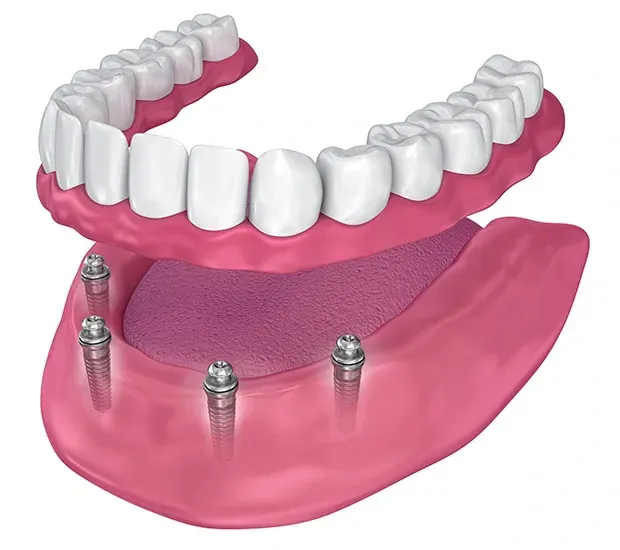Permanent Teeth in a Day with All-on-4® Implants at Riverside Holistic Dentistry
“The All-on-4 implant process gives the patient natural-looking teeth and helps them feel at ease chewing, speaking, and socializing.”
Causes and Effects of Tooth Loss
According to dental experts, losing teeth is common but not an unavoidable part of aging. Tooth loss may result from accidents such as slips or falls, or from facial injuries sustained during sports or vehicle collisions. Over time, untreated decay and gum disease can weaken a tooth’s structure, leading to wear, loss, or the need for extraction by a dental professional.
Severe decay often brings pain and irritation, while the absence of teeth can affect both function and appearance. Beyond the physical impact, missing teeth can also influence emotional well‑being. Common effects include:
Sensitivity to foods and drinks
Large cavities or failing teeth can make it difficult to enjoy hot or cold items.
Gum discomfort
Patients without teeth may struggle with eating and speaking, and some find full dentures uncomfortable.
Social hesitation
Missing teeth can cause individuals to avoid smiling or participating in social activities.
These challenges can greatly reduce quality of life. Fortunately, modern dentistry offers several replacement options. At Riverside Holistic Dentistry, our team can help you explore whether the All‑on‑4® implant solution is the right choice for restoring your smile.
“According to WebMD, tooth loss is a common but not inevitable part of aging.”
How the All-on-4® Implant Treatment Works
Replacing a full arch of teeth with traditional implants typically requires one implant per tooth. The All-on-4® method offers a more efficient alternative by using just four implants to secure an entire upper or lower row of teeth. This treatment is effective even for patients who have lost all their teeth. According to the American Academy of Implant Dentistry, the four strategically placed implants provide stable support for a complete arch of replacement teeth. Because bone grafting is not needed, the implants naturally fuse with the existing jawbone. Some implants are positioned at an angle, making them longer and able to provide additional strength.
The All-on-4® procedure is similar to standard implant placement but is completed more quickly, with a shorter recovery period. The process begins with impressions and X-rays, which are sent to a dental lab. At the treatment appointment, our team at Riverside Holistic Dentistry will administer a local anesthetic and, if necessary, remove any remaining damaged teeth. Four titanium posts are then placed in the upper and lower jaw to act as anchors. These secure the artificial teeth, restoring both function and appearance.
How the All-on-4® Implant Treatment Works
Following your All-on-4® treatment, our team will provide detailed aftercare guidelines to support proper healing and reduce the risk of infection. These instructions often include brushing gently with a soft-bristle toothbrush, keeping your head elevated while resting, and sticking to soft foods during the initial recovery period. It’s normal to experience some soreness, swelling, or light bleeding right after the procedure. If these symptoms worsen instead of improving, contact our office right away.
Long-term success depends on maintaining good oral hygiene. Just as with natural teeth, patients should brush and floss daily to keep the implants and gums healthy. Routine dental visits are also essential—your dentist will regularly check the implants and artificial teeth to ensure they remain secure and functioning as intended.
"Patients should maintain proper care of the implants and their oral health. Just as with natural teeth, patients need to continue brushing and flossing daily.”
Answers You’ll Find on This Page
People Also Ask
Common Questions About All-on-4® Implants
Don’t Wait For a Healthier Smile
Contact Us Today to Begin Your Holistic Dental Care



